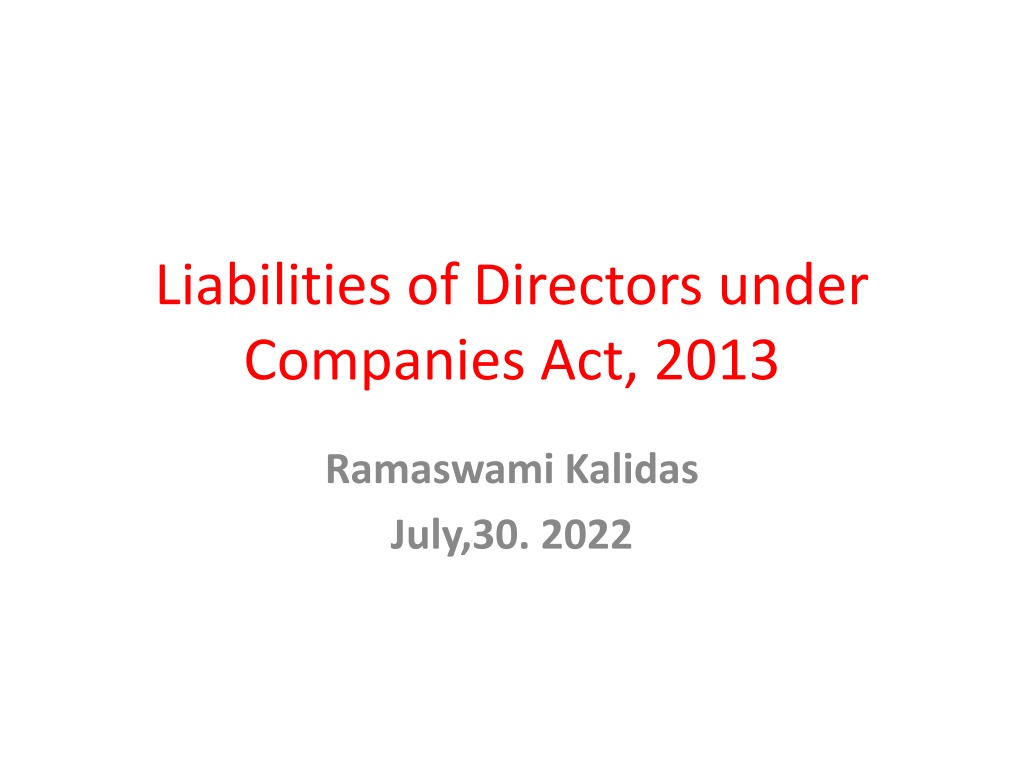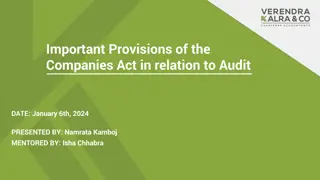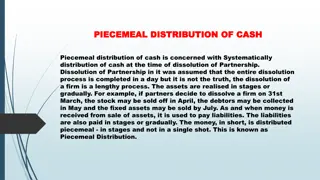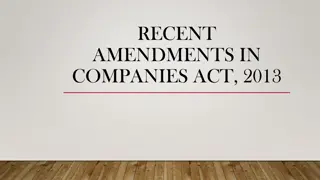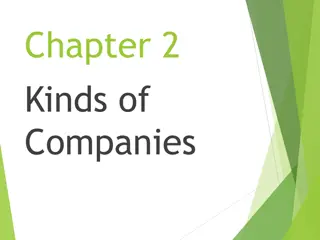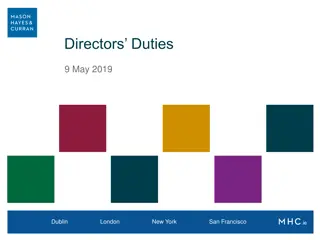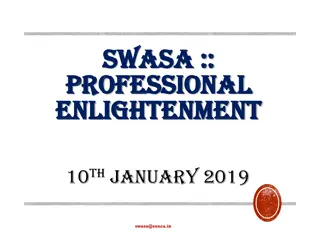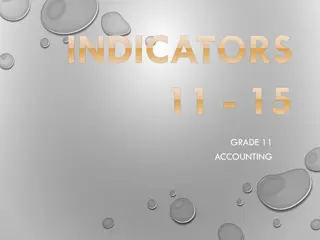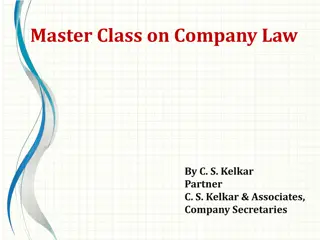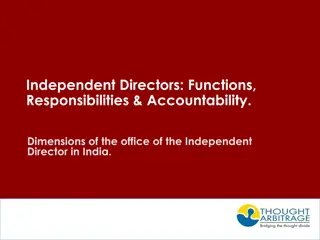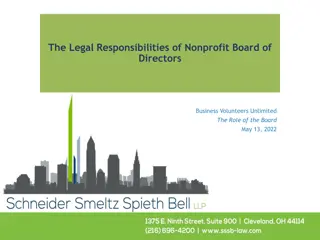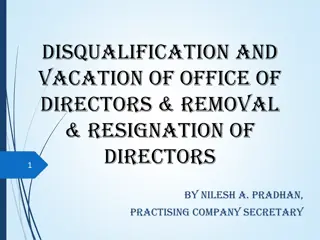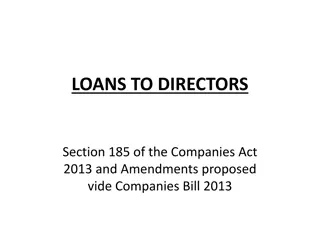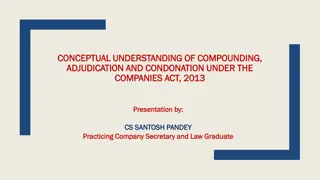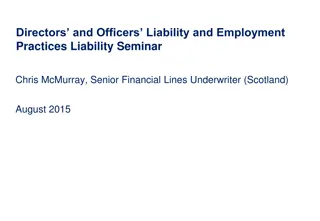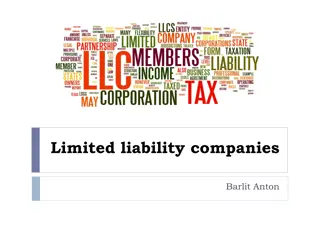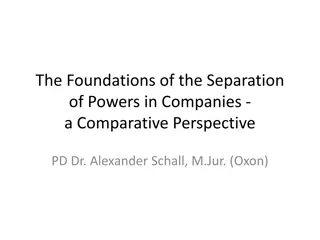Understanding Liabilities of Directors under Companies Act, 2013
Director's liabilities under the Companies Act, 2013 include definitions of directors, shadow directors, officers, and those in default. Responsibility for default and potential prosecutions for wrongful actions are discussed. Changes in definitions and concepts are highlighted to illustrate the legal framework surrounding directors' liabilities in India.
Download Presentation

Please find below an Image/Link to download the presentation.
The content on the website is provided AS IS for your information and personal use only. It may not be sold, licensed, or shared on other websites without obtaining consent from the author. Download presentation by click this link. If you encounter any issues during the download, it is possible that the publisher has removed the file from their server.
E N D
Presentation Transcript
Liabilities of Directors under Companies Act, 2013 Ramaswami Kalidas July,30. 2022
Director-Restricted definition under the Act Definition of Director-Sec 2(35) prima facie restrictive and exhaustive. Refers to one appointed as director to the Board. Contrast with inclusive definition under 1956 Act which included anyone occupying position of director by whatever named called. Earlier definition covered both de jure and de facto Director bringing in concept of Shadow director.
Shadow Director-Relevance in the law Shadow director-One on whose advice and directions the Board is accustomed to act. He is liable to be prosecuted for wrongly acting and dominating Board.(Maharashtra Power Development Corporation v Dabhol Power (120 Comp.Cas 560). Even Holding company could be shadow director. Status of director ambivalent under present Act. Despite means definition concept gets stretched to cover persons acting as one.
Officer and Officer in Default-Inclusive concepts Director is an officer under 2(59) and Officer who is in default in 2(60). Both Sections consider person on whose advice Board/one or more directors are accustomed to act except in professional capacity. Change in definition of director under present Act only a matter of semantics!.
Officer and those in default-Director can be only natural individual officer inclusive term to cover empowered employees, Auditors and Holding company also. Director only natural person-Oriental Metal Processing Works(P)Ltd v Bhaskar Kashinath Thakore(AIR SC 573) Officer in default covers KMPs,WTD , any person on whose advice Board acts as also director responsible for default of any violation of which he has knowledge/participated at meeting without any objection.
Responsibility for default when arises Mens rea-No longer necessary to hold any one guilty under Section 5 of 1956 Act.( Sukhbir Saran Bhatnagar v ROC)(42 Com Cases 408). When does responsibility arise for default? Default should happen during tenure of appointment.(C.V.Siva prasad v ROC)(88 Com Cases 420) Section 2(60)covers defaults under the Act only.
Responsibilities of Directors All directors responsible where responsibility has not been assigned to anyone specifically. (ROC v Southern Machinery Works Ltd 59 Com. Cases 670). Collective responsibility also stems from ,definition of Board under Section 2(10)-Emphasis on collective body. Collective conspicuous by absence in previous Act. Where director has resigned before commission of offence , no liability .Question as to when resignation takes effect to be decided by court based on circumstances. Dichotomy between Section 165 and 168 on resignation when effective.
Directors fiduciary responsibilities Whether director can be held liable for economic offences under Section 2(60).No as held in Madras Flying club v Deputy ROC(214 Com Cases 428). Directors liabilities arise due to fiduciary relationship they have with company. Status of directors analogous to Trustees/Agents - they are neither in full measure. Separation of ownership and control- unique character of corporate form. Fetters over directors powers inbuilt in the Act.
Liabilities-Different connotations Liability Meaning. Several hues to term. Obligation or duty to do or not to do something . Apart from financial obligations, refers to obligation of any kind. Civil Liabilities-Accountability and responsibility enforceable by civil legal sanctions. Criminal liabilities-Enforceable by criminal legal sanctions.
Actions giving rise to liabilities Liabilities can arise to Directors out of : Breach of fiduciary duties Acts which are ultra vires. Negligent Acts. Action which is mala fide.
Duties of Directors under Act Duties of directors under Act-Section 166. Duties of IDs in Schedule IV of Act. Duties enshrined based on Report of Dr.J.J.Irani Committee Section166 watershed provision - duties of directors spelt out for the first time. Previous Act only contained in Sec 312 provision relating to assignment of office by director. Section 166 - corresponds to Sections 171 to 175 of UK Act,2006. Duties: To act in accordance with Articles. Exercise powers and perform duties as per Articles.
Duties of Directors To act in good faith Promotion of objects for the benefit of all stakeholders. Exercise of ordinary prudence and rationality. If judgmental errors still arise, no responsibility on directors. Not be involved in situations giving rise to interest direct/indirect which is /maybe in conflict with company s interest.
Duties of Directors Not achieve any undue gain /advantage for himself, relatives , partners, Associates and if involved, provide for disgorgement of benefits. Shall not assign his office. Assignment void in law. Appointment of Alternate director is not assignment of office nor is nomination of successor. issue of POA to others is not assignment Cash penalty for contravention. Duties are codification of the common law principles enunciated
Application of Common law principles Views on breach of fiduciary responsibilities in Jurisprudence Fiduciary responsibilities- do not extend to advising shareholders on whether they should invest in additional shares in company.(Sangram Sinh P.Gaikwad v Shantidevi Gaikwad(123 Comp Cas,566) No contract with company which is in conflict with interest of company.
Jurisprudence on subject No secret profits to be earned at the cost of company. Disgorgement of gains ordered in many cases. Logic-profit belongs to company . No delegation of responsibilities - Delegatus non potest delegare . Liability for illegal acts Use of company funds for illegal purposes, Provision of bribes to foster company interest.
Types of Action against directors Derivative action against directors Where director fails in fiduciary duties in exercise of his powers ,courts have authorized shareholders to sue company for exercise of their rights . Relief goes to company. Representative action-where shareholder proceeds against the company both on his behalf and for other shareholders as in cases of oppression/mismanagement.(Section 241 and 245)
Derivative Action When allowed Derivative action against company allowed in the following: Where directors proceed on ordinary resolution of members where special resolution called for under law.( Dhakeshwari Cotton Mills v N.K.Chakroborty(AIR 1937 Cal 645) Ultra vires and illegal acts-Members can intervene to prevent acts which are ultra vires the company or the Act.-Shareholders have a right to expect a company to run as per its constitution. Board can be restrained from action ultra vires the Board and intra vires the company also.
Derivative Action allowed Cases of fraud-Managerial powers cannot be used for perpetuating fraud on minority. Action lies against board and company in such matters. Transfer of control of company-Where Board has passed resolution for transfer of controlling interest without seeking sanction of members.
Derivative Action cases Where directors delayed making calls on shareholders as they had defaulted on their own calls. Where sale of assets was on an obvious under- valuation. Where company was under insolvency and directors were helping themselves with payments such as gratuity.
Derivative Action allowed Diversion of funds-Where there is unfairly prejudicial conduct leading to diversion of funds for extraneous purposes. Provision of loans improperly and at rates prejudicial to interest of company. Where directors by virtue of majority powers divert business opportunities for their own interests. Where majority power is used to stifle minority.
Examples of action leading to derivative action Improper rejection of votes by chairman to stifle minority. Issue of shares mala fide to increase control. Exclusion by Majority of directors of those representing minority shareholders. Where wrongful acts have been committed to run business but those in control would not permit institution of proceedings.
Where derivative action has not been allowed Infringing on personal rights of shareholders such as interference on right to vote . Expropriation of company s property for their own use. Where derivative action does not lie Where directors have applied their minds in drawing up the financials in good faith. Where the directors have decided on the place of the meeting.
No derivative action Where the directors have decided to distribute dividend while debts remain unsettled. Where the complaint is as to the manner in which profits have been determined. Courts would not interfere with discretion of directors to use company funds as per authority granted.
No to derivative action Where negligence in Management has been alleged without substance. Foss v Harbottle rule Right of Minority to intervene not to prevail. Where action is brought in for dilution in firm s valuation despite no negligence by Board. Where company suffers losses .
Liabilities of Independent and non- executive directors Liabilities of Independent and non-executive directors- Insulation under Section 149(12) Sub-section overrides other provisions in Act. Applies to Independent directors and To non-executive directors not being part of promoters or KMPs. No liability for acts of omission or commission unless such act is with his knowledge ,attributable through board processes
Section 149(12)-Analyzed There is consent or connivance There has been absence of diligence . Above are to be proved circumstantially. Insulation also applies to Nominee Directors. Decision in V.Selvaraj v RBI(2020)157 CLA 30- No material to show active participation in day to day affairs or in Board meetings-Held not guilty of omission or commission due to neglect.
Nominee directors liabilities SAT Tribunal decision-ID not responsible for refunds of money collected in contravention of Act/ICDR Regulations where such payments received prior to his appointment.- G.Unnikrishnan Nair v SEBI(158 SCL91). Nominee Directors liabilities Definition in Section 149(7)-Explanation One nominated by financial Institution under any law or by any agreement or appointed by the govt. to represent its interests.
Nominee Directors Nominee Director-Not independent. Gives rise to conflict of interest as between company and institution whose interest they represent. Whose interest is paramount-whether company or Institution. He has to consider interest of company and not be a nominated watch dog. Classic case of Scottish Co-operative Wholesale Society Ltd v Meyer(1958)-Wrong on the part of Nominees to protect interests of nominating society.
Nominee Director-Conflict of interest Section166 sets out duties for all directors including Nominees . Duty cannot be merely to protect interest . Duty to act in good faith extends to the interest of shareholders as a whole. He can protect Nominator interests if it is coinciding with interests of company. Bound by rules of confidentiality and not allowed to make unauthorized disclosures to Nominator .
Nominee director-liabilities Immunity from liability accorded to Nominee director under specific provisions of acts under which appointed. Administrative instructions issued also to insulate them from liabilities. However exercise of good faith common to all directors .If nominee fails liability fastens. (Geetanjali Mills Ltd v Thiruvengandham(1 Comp.LJ232). No immunity if Nominee is personally involved in default.
Criminal liabilities Scope reduced to commission of non-technical offences Vicarious liability-explained Can independent and non-executive directors be criminally prosecuted . Supreme Court-in Bharti Air tel Principle of alter ego. Only those in authority can be proceeded against
Liabilities-Modes of Insulation Hedge mechanism against Directors liabilities- Under Act and Regulations Reg-25(10) LODR D&O Insurance in top 500 companies for such value and for covering such risks as determined by board.-Should extend to all Directors. Responsibility on WTDs/MD/KMPs for specific duties. u/s 2(60) Protection 149(12)
Self-created insulation mechanism Self-created Mechanisms Strong and independent Board Diversity of talent in Board room Legal compliance system-On line tools. Persons of re-eminence. In the Board Room Sound Board practices Good remuneration structure. Compliance Committee of Board Routine updates on changes/updates in laws.
Impact of decriminalization of offences Trigger Ease of doing business. Introduction of fresh start scheme-companies could turn a new leaf. No additional fees, condonation of delay in filing documents. Changes based on Report of High power Committee Criminal punishment against technical, procedural and minor non-compliances deterrent to company formation and vibrant economic activity.
Decriminalization impact Concept of In-house Adjudication framework under Section 454- Adjudication by Registrar through on line process. Result- de-clogging of judicial forums such as NCLT. Criminal proceedings in matters where there was no intent to defraud converted to civil wrongs.
Amendments relating to penalties and offences Substitution of criminal fines by civil penalties. 23 criminal offences decriminalized.(misstatement in prospectus, related party transactions, buy back ,CSR non-compliance etc.). Harbinger to process of self-regulation Reduction of fines-May lead to complacency. Cost of non-compliance should not be more than cost of compliance. Double edged sword which cuts both ways. Behavioral attributes
Thank You Very Much
